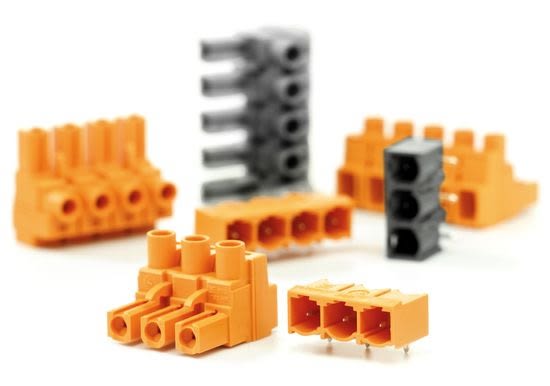 Non-reinforced, flame-retardant and non-hydrolysis-stabilized polybutylene terephthalate (PBT) has long-term resistance to natural climates worldwide. This was the result of a study conducted jointly by Weidmüller and LANXESS on specimens and components made of the PBT Pocan KU 2-7503/1.
Non-reinforced, flame-retardant and non-hydrolysis-stabilized polybutylene terephthalate (PBT) has long-term resistance to natural climates worldwide. This was the result of a study conducted jointly by Weidmüller and LANXESS on specimens and components made of the PBT Pocan KU 2-7503/1.“We were able to prove that – as required by many of our customers – the relevant components can withstand temperatures of 40 °C at 85 percent relative humidity for 40,000 hours. These conditions are typical of tropical climates and pose the toughest load scenario faced by PBT in terms of degradation through hydrolysis in natural global climates,” said Alexander Radeck, an expert in flame-retardant thermoplastics in Applications Development in the Semi-Crystalline Products business unit. As a flame-retardant PBT was used in the study, the results can also be applied to non-reinforced PBT grades that are neither hydrolysis-stabilized nor fire-resistant, because additives used to boost flame retardance increase the thermoplastics’ sensitivity to hydrolysis.

This was the first time that long-term test procedures were used to systematically analyze the service life of electrical components made of non-hydrolysis-stabilized PBT, such as plug connectors, PCB terminals and connections in various climates around the world. In the past, the hydrolytic degradation of PBT under long-term conditions was determined almost exclusively in time-lapse tests. “However, these accelerated tests do not reflect the natural climate load scenario to which, for example, PBT plug connectors are exposed in the majority of applications,” said Dr. Claus Maertin, Project Manager TE Plastics, Technology Development, at Weidmüller.
The tests were performed on specimens, plug connectors and PCB terminals. With the latter, the insulation resistance (DIN EN 60512) and voltage and surge voltage strength (IEC 60947-7-1) were tested after storage in normal and tropical climates, among others. “The electrical functionality of the components is not impaired even after storage in extreme climate conditions and therefore complies with the product standard despite the load,” explained Radeck. The components can still also be plugged in and removed with ease after aging.
After storage, the PBT specimens were checked for changes in material composition and in their mechanical and electrical properties. The electric strength (IEC 60243-1) was hardly affected at all, even in the case of one sample whose mechanical properties worsened considerably after storage in an unnatural, supercritical test climate of 70 °C and 85 percent humidity. The tensile and flexural strengths (DIN EN ISO 527-2 and 178) remained largely stable even after storage in supercritical conditions at 70 °C and 85 percent humidity. The impact strength (Izod 1U) and viscosity were far more sensitive, dropping significantly at 70 °C and 85 percent humidity. However, the impact strength of the stored specimens fell only slightly at 55 °C and 85 percent humidity.
The Izod impact strength was chosen as the reference parameter for calculating the long-term resistance of non-hydrolysis-stabilized PBT in natural climates based on the Arrhenius approach. This parameter reacts most sensitively to the chosen test climates. “Even if this parameter is taken as the starting point of the calculations, PBT still has no problem in meeting customer requirements for a service life of 40,000 hours at a temperature of 40 °C and 85 percent relative humidity. This result ties in with our observation that Weidmüller PBT plug connectors have – over three decades – exhibited an extremely long and reliable service life worldwide,” said Maertin.



